Composer Brian Tyler recently wrote the scores for two sequels in the past few months: the sci-fi horror Alien vs. Predator – Requiem and Rambo, starring Sylvester Stallone. We asked Brian about these works and some of his past projets.
Could you tell me what were your early musical influences and what pointed you to learn at UCLA?
I have many influences, but I'm not sure any of them pointed me towards UCLA or not. There were many composers who influenced me to study music in general. Probably my biggest influences were Bernard Herrmann, John Williams, James Horner, Maurice Jarre, Jerry Goldsmith. There were too many to name, but I loved scores and writing in that particular style. UCLA I just really sought out because I loved the school, I wanted to go there. The reason was that they not only had a great academic school, but they also had a really good world music program. For me, it was very interesting to learn about music from China, Japan or India. Before college, I studies a lot of orchestral music, Western style and piano through Chopin, orchestration through Berlioz, Bartók and Stravinsky. Now I wanted learn about music that was from different parts of the world than Europe.
Do you remember your first ever composition?
I think it was actually called D, just because it was in the key of D. I'm pretty sure it was a D minor ninth kind of piece. I think I still have it written down somewhere, I must have been six or seven years old at that time.
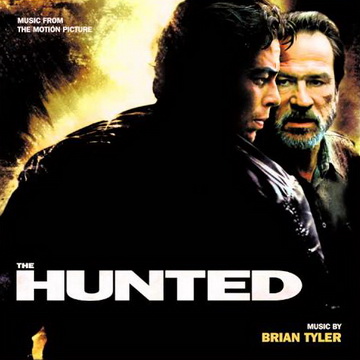 What is your usual working method? At what stage are you drawn into the production?
What is your usual working method? At what stage are you drawn into the production?It varies. Sometimes I get the screenplay and start getting ideas from that. It is very gratifying for me to start from the beginning even before they start filming, to get some ideas and formulate themes. The first thing I always do is write the theme to scenes of the film, be it melodic or textural. Sometimes a movie like The Hunted, Bug or even Alien vs. Predator – Requiem doesn't have a theme that is melodic, its in a more modern language musically, something dissonant or atonal. However, I always want to establish the feel for the music. For me, its very clear what kind of instrumentation will I use. I'm not sure how that works in my mind, but somehow I always know what kind of instrumentation will appear, be it symphonic, electronic, a single guitar or whatever it might be. The majority of my work is done once I get the film, watch the scenes and there is always input from the director. We decide where the music should go and where it should be silent. I don't really listen to temp scores at all, I specifically ask for not to be given a temp score, so when I get a cut of the picture, it is just dialogue and sound effects. I don't want to be influenced by the temp scores.
Some composers visit the sets. Do you do that?
I love visiting the sets. I don't know how many musical ideas I get there, but I just like doing it. Sometimes, the directors just let me appear in the film, in the background.
On many of your scores, you play various instruments, such as piano, guitar or percussion. Why do you insist on playing these instruments?
There are two reasons. Some instruments are very personal and I'm very specific in what it should sound like. For instance, the melodic lines on the guitar or the piano are both very personal to me in how they are played. If I have someone else play my piano parts that are melodic, it never quite sounds right to me. So much of how the piano solo sounds like depends on the player, that's why I prefer to do it myself. Things like percussion I usually play myself because I use a lot of world percussion, which most orchestral percussion musicians don't play and they don't necessarily have access to all the various instruments I have here in my studio. Another reason why I often play percussion is that I write the parts that would be very hard to sight-read during a session where the whole orchestra is waiting. Sometimes there are twenty to thirty parts to be played on the percussion instruments, if these passages are so syncopated, it won't sound very good being played by other people unless we practiced for hours. So essentially it's a combination of creative reasons and to save time. There are also a couple of exotic instruments, such as a bazooki or a charango and I would alter it by using a cello bow instead of a pick or my fingers. It's things like that really – if there's no other player doing it, I could do it myself.
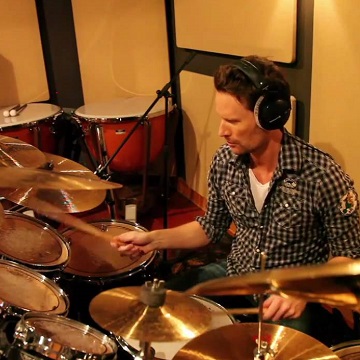 What was the strangest instrument you ever used?
What was the strangest instrument you ever used?There are a few. One is a long piece of metal with a piece of glass on one end and I play it with a cello bow. It has no name because I just made it. I've also used coffee cups that were stuck into cellos and played as a part of the instrument – a Styrofoam coffee cup that sounded pretty strange. I've also used a musical stand with coke bottles piled on top of it that I just hit with sticks.
What type of music do you listen to?
I can check my iPod for that. I listen to classical music, rock, electronic music. I like atmospheric music, I like hip-hop, jazz... I'm here looking at my list of what I listened to recently. I have Amon Tobin, Blond Redhead, Muse, Black Sabbath. I have a wide range of music I listen to.
Does a versatile taste in music helps your compositions?
I think it does. I think there is great music in every genre, to close one's mind off any genre of music doesn't make any sense. No one can force themselves to like anything they don't like truly, so sometimes it is really difficult for a composer if they don't like a type of music, there is no way you can force them to write good music in that genre. For me, I like pretty much every genre of music and I listen to all of it by choice, so it's fairly easy for me to write in different styles.
You worked with John Carpenter on Vampires Los Muertos. Since Carpenter scored most of his movies, what kind of input did he have in regards of the score?
I spoke with John about this. As a child, I had so many of his scores Halloween, Escape from New York, so I was a big fan. The thing he wanted to do and I agreed was to combine some of the electronic elements that he liked, but do a lot more live recording that he usually would. That's why I played a lot of live percussion and nylon-stringed guitar on the score and made it a little bit more organic than some of his other scores.
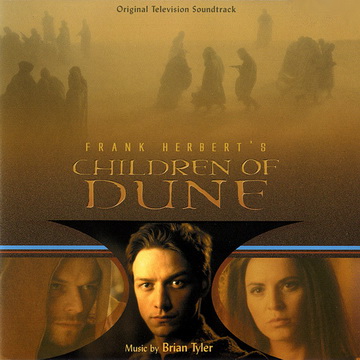 On Children of Dune, you have a song called "Inama Nushif" which is sung in Fremen. How did you find the language and what's the song about?
On Children of Dune, you have a song called "Inama Nushif" which is sung in Fremen. How did you find the language and what's the song about?With "Inama Nushif", we wanted to have something sung in Fremen, the only problem is there's no Fremen dictionary. (laught) So I looked through all the books Frank Herbert wrote and some that his son, Brian Herbert had written on Dune. In those books, there are a couple of paragraphs that will give you a word or two in Fremen, then translate what it means. So we gathered every possible bit of Fremen language that were translated already, than I put these words together and tried to create something poetic about Chani and the lyrics were kind of about her from the perspective of Paul Atreides. It was really just an exercise searching through the books to find the words.
How did you get on the Timeline project after Jerry Goldsmith already wrote a score for it?
I got on the project purely by getting a phone call from the director to do the film out of the blue. I didn't know anyone personally on the film, I didn't go out for the film. In fact, I had heard that Jerry Goldsmith had been dropped from the film and I was rather upset about that, because he was one of my favorite composers. So I was very surprised when I got the phone call to do the film, so I went in composing the music and wanted to write my own tribute to how much Jerry influenced my composing style.
Did you hear Goldsmith's work before writing the score?
I did not want to hear the music before I composed my score. I had the feeling that if I had heard the score before I wrote my music, I would think it was so great that I would not know what to do. Than I would feel I would have to write a better score, feeling that I couldn't have. So I chose not to listen to the music and watched the movie as if Jerry had never wrote his score. After I finished the film, I bought Jerry's version of the score so that I could hear it and I thought it was great. I kept it in my rotation and listened to it quite a lot. It's kind of interesting to see how someone else would have approached the film, coming from a different angle.
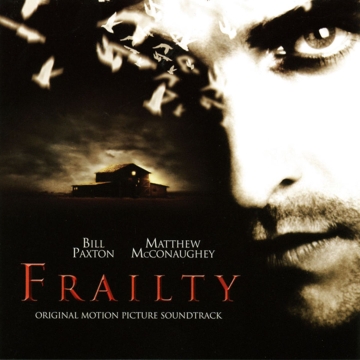 You built up a relationship with Bill Paxton, scoring the picture Frailty and The Greatest Game Ever Played. How did you two meet?
You built up a relationship with Bill Paxton, scoring the picture Frailty and The Greatest Game Ever Played. How did you two meet?Bill heard some of my music from another movie. I had never met Bill before, but he liked my music and felt it sounded like music from an older era. He wanted to have a score for Frailty that was more in the style of Bernard Herrmann, rather to have it sound someone like Hans Zimmer. He wanted something of an older style and had no idea of my age. He heard my music and thought I was actually 60 years old, for some reason, I sounded like an older man to him. When I came in to meet him, he was rather surprised, because I was about 28 or something like that at that time. It was a great experience working with him on that, than working on such a different movie called The Greatest Game Ever Played. Different in tone, but also different in the sense that it could have been written 30 years ago.
The guitar parts on The Fast and Furious: Tokyo Drift were performed by Slash. How did you get him on the movie?
I was recording guitar part for "The Fast and Furious" and my friend the director was listening to me play the guitar and he said "That sounds like Slash." I said, "Yeah, it kinda does sound like Slash, maybe we should actually get him", but of course I was joking. I never imagined I would be able to just call up Slash to come by my house to record, but that's just exactly what happened. I hot in contact with him and asked "Hey, do you want to play on The Fast and Furious?" It turns out he is a big film score fan and knew my work. He just drove over because he actually lives very close to me, he lives only a few minutes away from me. He came over to me at my studio and we've been friends ever since.
You recorded War with the London Symphony Orchestra. What kind of memories do you have of the recording?
Oh, it was fantastic. They are a great orchestra and they have such great history recording scores like Star Wars. It was a great experience conducting the London Symphony Orchestra. Now I can say I conducted them and that's a pretty cool thing to say.
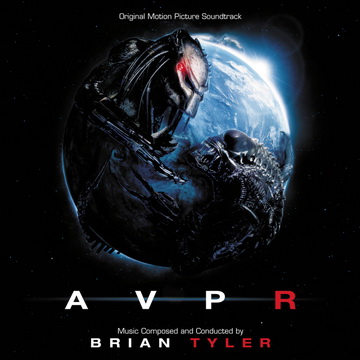 Let's turn to your latest project, Aliens vs. Predator – Requiem. How did you get the job?
Let's turn to your latest project, Aliens vs. Predator – Requiem. How did you get the job?I'm a huge fan of both the Alien and the Predator scores. When I heard they were making another movie, I let 20th Century Fox know that I was interested. It just turns out that the directors of the film, Carl and Greg Strause were listening to my music before they were even filming the movie. They ha some of my music from Constantine and Darkness Falls and felt that it had the kind of style, which was very orchestral and sounded like the original scores. I met them and told them that I think the score should be a throwback, an homage. They agreed and I was brought on the film even before they started shooting.
What kind of moments are you referencing in your score to Aliens vs. Predator – Requiem?
I don't think there were any specific moments, I just wanted the entirety of the score to reflect different parts of the original scores. Sometimes it was at the same time, sometimes it was overlapping, but it had the orchestration style of Jerry Goldsmith with the strings, the percussion was from James Horner's Aliens and the tribal percussion of Alan Silvestri is throughout the movie. Also, there are the orchestral fireworks that Elliot Goldenthal did in Alien 3, I wanted all of those elements to be there throughout and at the same time, it would be its own score as well.
Are you referencing Harald Kloser's music from the first Alien vs. Predator?
Yes, I know the score and have seen the movie many times and while I liked the music, the directors didn't really want that style, they wanted the sound of the original scores. The way I worked I based it on the language established by Jerry Goldsmith, James Horner and Alan Silvestri.
For how long did you work on the picture?
I wrote it over maybe for four months. I was one the film for much longer but I wasn't actually writing the score, I was working on other films too.
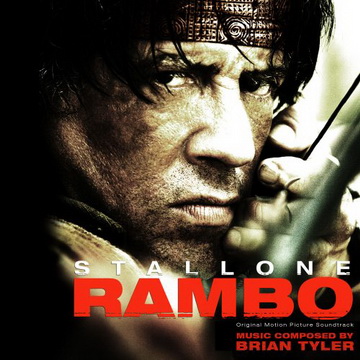 Your other latest work is Rambo. Will you be using Jerry Goldsmith's themes or will you write your own themes?
Your other latest work is Rambo. Will you be using Jerry Goldsmith's themes or will you write your own themes?Yes to both. I'm definitely using the Rambo theme throughout the score, I love that theme. I'll be recording it with re-arrangements and new orchestration, but the Rambo theme is in it and it sounds fantastic. I'm also writing two new themes for Rambo that work specifically for this film. My themes and the Jerry Goldsmith themes often intertwine. One of my themes is a very strongly stated motive that is very melodic, but it's slightly different tone than the original Rambo theme because of the difference in the story line of this film. I'm very proud of this score and can't wait to see what people think about it.
Now you have scored for two franchizes and as we know, fans can be very picky about franchize scores. Do you feel any kind of pressure because these scores would be examined more than your other works?
For me, Aliens and Rambo are all scores that I am a fan of. I wanted to be extra careful an extra diligent to make sure that if I was listening to it and I hadn't written it, I would love it. I've poured everything I have into these scores so that people could really experience nostalgia, hearing something that is familiar, but taking it to another level in developing the themes and developing the music. This way the music won't sound like a re-recording, but it will be like a new chapter. Especially in the case of Rambo where I'm using Jerry Goldsmith's themes, the expectations are high and I worked very hard to make it sound the way that I'd make the fans of the Rambo scores and Rambo movies very happy.
What movies will you score in 2008?
The next movie right after Rambo will be Bangkok Dangerous starring Nicholas Cage. This score will be epic at times, very thematic and at times very percussive and modern, it will have a little bit of flavor of Thailand as well. Than I have The Lazarus Project, which is a film about Purgatory, very thematic and introspective with a much smaller sound, I'll be recording that with a string quintet. Than I have The Killing Room directed by Jonathan Liebesman, who directed Darkness Falls. If time allows after that, we'll be doing The Fast and Furious 4.
Will there be a Constantine sequel?
We talked about a Constantine sequel and I believe there is an idea storywise, but I don't know if it's at a stage that it could be filmed yet.
How involved are you in the production of the soundtrack CDs?
I'm very involved. I always want to put my input on the CD, but I don't always have control over the order of the tracks. I trust Varése Sarabande, I believe they are a great company, they try to put on as much music on the CD as possible, but inevitably, the types of scores I write tend to be longer, but I like to be able to put on as much music as I can to give a real scope of what is in the film.
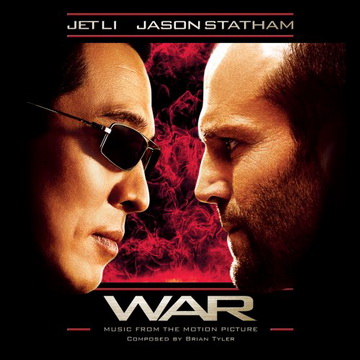 Some of your recent scores like War were released on iTunes and CD. What are your thoughts on downloadable soundtracks?
Some of your recent scores like War were released on iTunes and CD. What are your thoughts on downloadable soundtracks?I like CDs, since there is a booklet and you can actually physically hold something in your hand. With War it was released both on iTunes and on CD, which for me is the ideal way to release it. If someone wants to download it, I want it to be available for them, so I like having it both ways.
You've attended the Los Angeles Composer Expo and was the host of the first film music conference in Ubeda. What are your thoughts on these events?
I love these events. I think I'm going to do another one this summer. It's really great to be able to meet film score fans, just talk about things, involve the fans and kind of show them what we do.
It has become a tradition to have film music concerts on these events. If you had to put together a program of your work, what would you choose?
I think I would do The Greatest Game Ever Played, Children of Dune, maybe some Timeline, Partition, Alien vs. Predator – Requiem – I'm not sure, I haven't thought about that really.
Finally, how do you usually spend your free time, when not writing scores?
I'm spending my free time trying to get a tiny bit of sleep. I mostly spend my days writing film scores well into the night. Something I do like that has nothing to do with film scoring or sleeping is racing cars. I'm a big race car fan, I love Formula 1 and I race locally in California in an amateur racing league for Ferrari. Sometimes I try to emulate Michael Schumacher in order to some times get away from scoring films.
To know more about Brian Tyler's work, please visit the composer's official website.
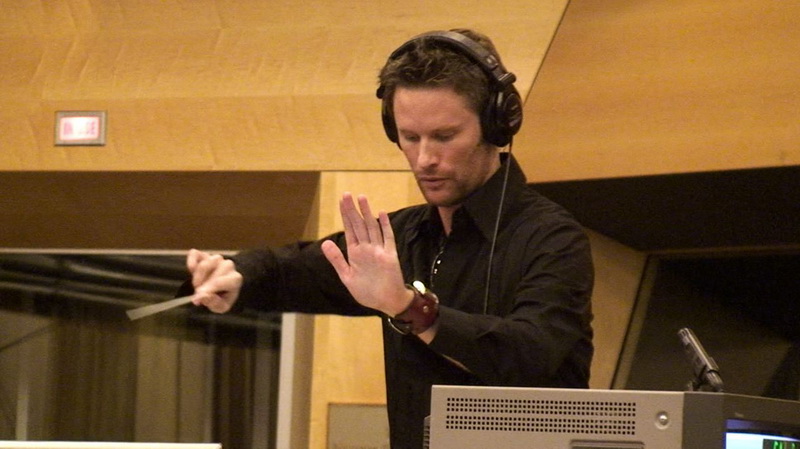
Composer and conductor Brian Tyler
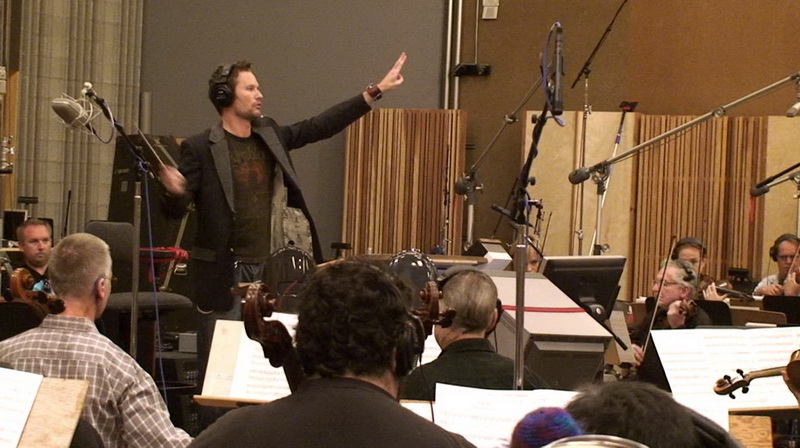
Brian conducts the Hollywood Studio Symphony
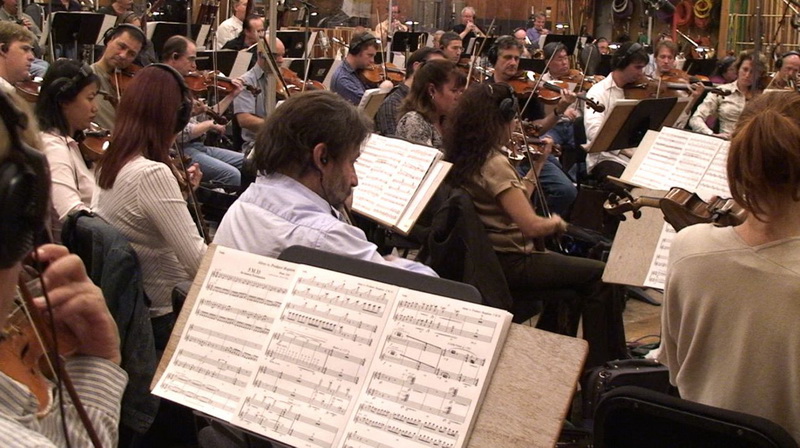
The violin section
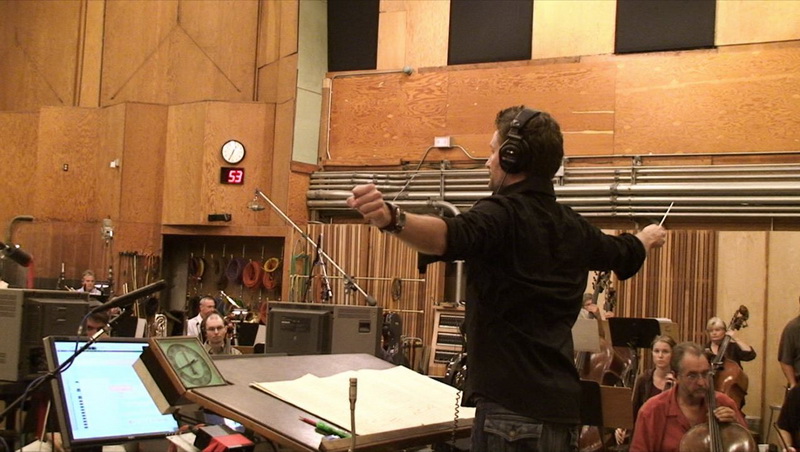
Brian conducts the orchestra
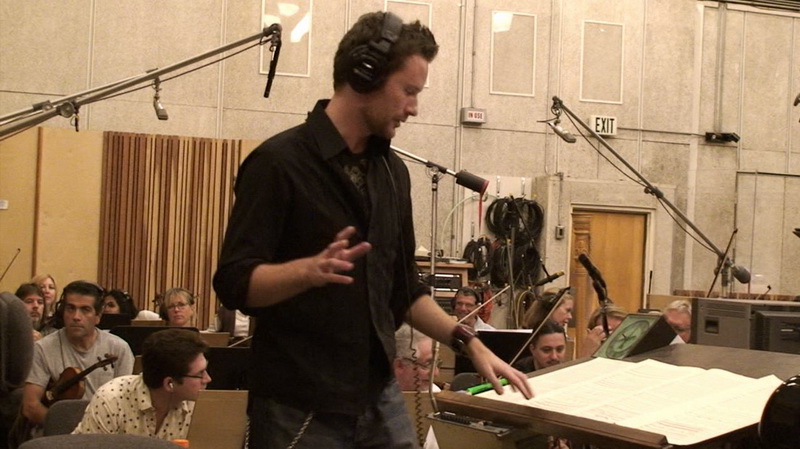
Brian is discussing an idea
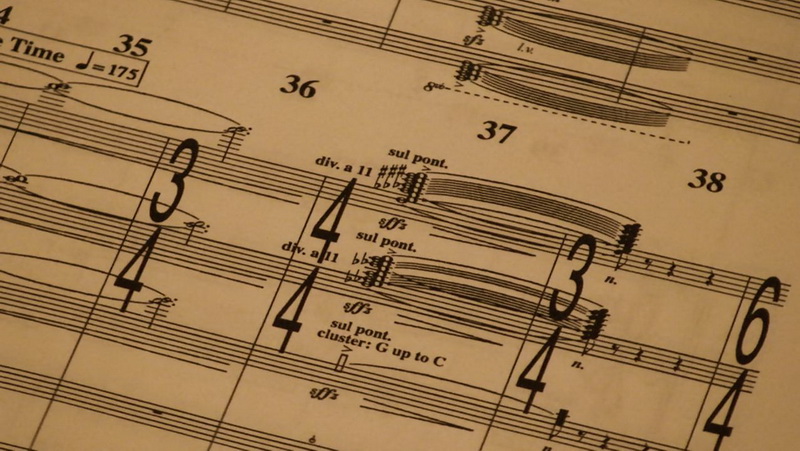
Sheet music from AvPR
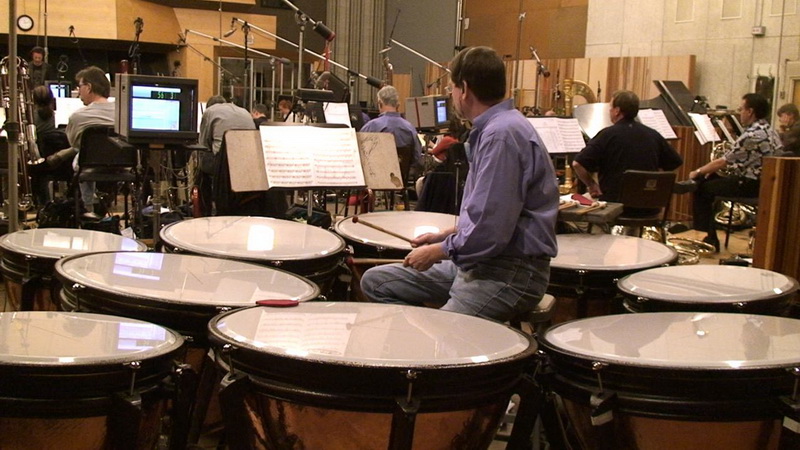
Between the timpanis
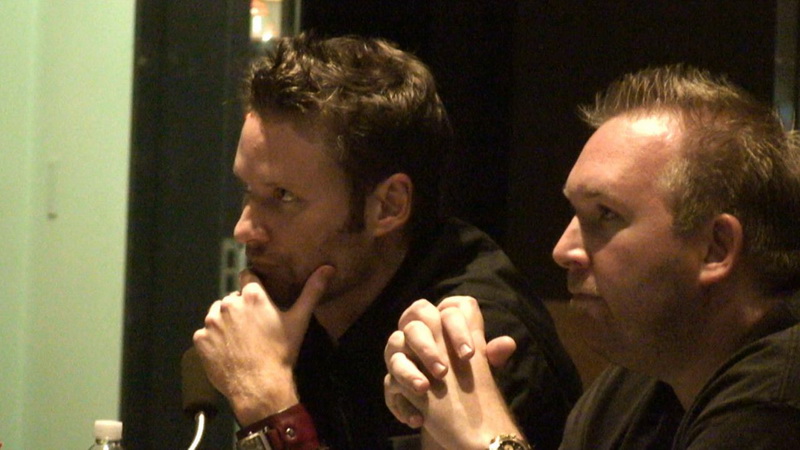
Brian with Greg Strause, one of the two directors
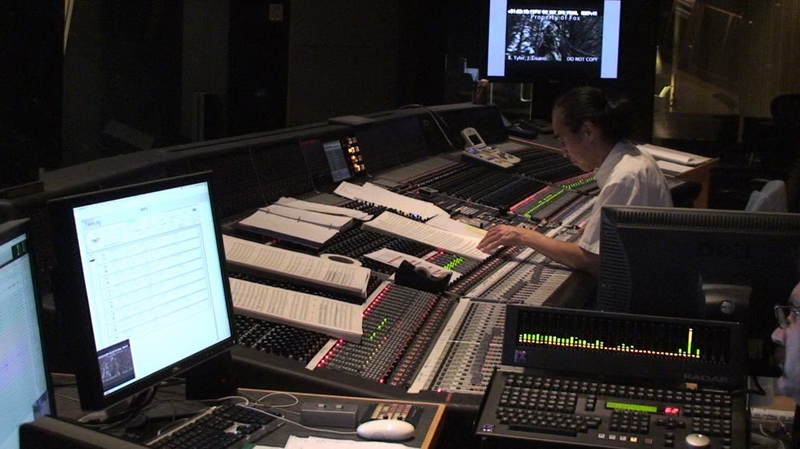
Score mixer Joel Iwataki
Photographs from: Brian Tyler
Special thanks to Pakk Hui
January 30th, 2008
Special thanks to Pakk Hui
January 30th, 2008







